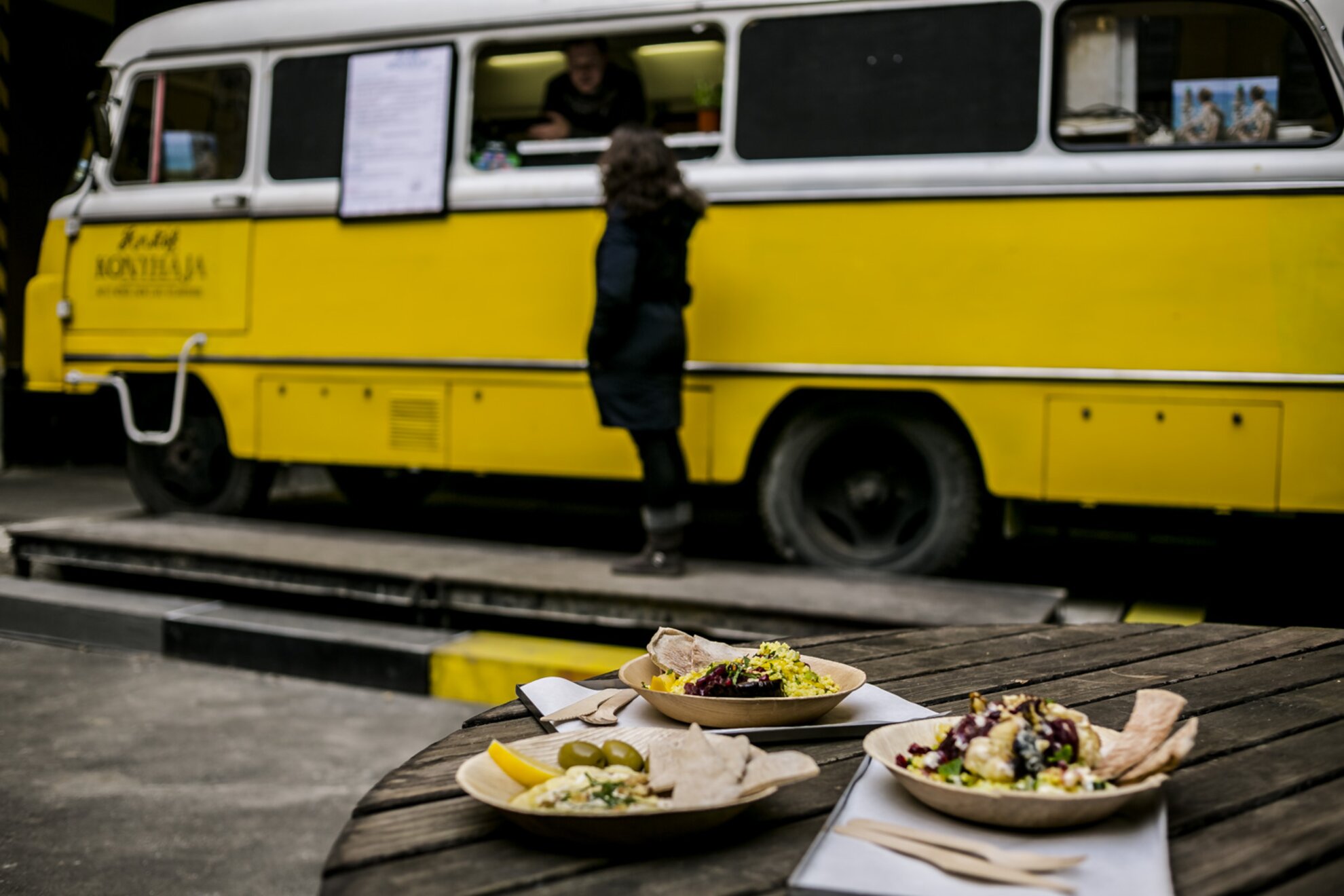When Kristóf Steiner – a Hungarian celebrity and author of a popular vegan cookbook – officially opened his unit in the Élesztő Food Truck Court, his delicious vegan dishes were gone with the wind in less than three hours. At the small yellow vintage Robur bus, lovers of vegan cuisine can embark on an exciting culinary adventure to discover how vegan meals work as street food, indulging in such treats as tabbouleh salad, tunki-tunki sandwich creams and sauces, and meat-free chili.
Kristóf currently lives in Israel, and only occasionally comes to Hungary, so his food truck is operated by Hungarian chef Balázs Vajas – the owner of VinoPiano and Pancs gasztoplacc – while the tunki-tunki treats are presented by Kinga Wertheimer. The menu includes popular international recipes from Kristóf’s cookbook, titled Kristóf konyhája. However, when we visited at the time of the official opening, they worked with a set menu in order to enable guests to try a wide variety of Kristóf's vegan dishes without having to order them one by one.

This way, we were served several dishes on the same plate, like “World Peace” cauliflower with tahini yogurt, pine nut, pomegranate, and tabbouleh (that we can also devour by itself for 1,390 HUF), tabbouleh salad made with herbs, mint, and pomegranate seeds (1,190 HUF), meat-free chili (1,490 HUF), Greek frikadeller made with carrots and enhanced with nutmeg and clove (1,290 HUF), and couscous spiced up with Eastern flavors. As they generally sell approximately 50-60 portions of vegan treats daily, they thought that preparing four times as much food for the official launch of the eatery would be enough – the food truck had already been operating for a month prior to the official opening – however, by the time Kristóf finished signing copies of his cookbook, only cookies were left, and guests had to keep up the fun with drinks alone.

We already tasted some courses after the opening of the Élesztő Food Truck Court, and we guarantee that these flavorful dishes will win over the hearts of even die-hard carnivores. The menu of this yellow bus also features eggplant made in Bollywood style with red lentils (1,390 HUF), “Alu Góbi” Indian potato-cauliflower with Indian red lentil, walnut, and vegetables (1,290 HUF), and “Baba Ganoush Libanese eggplant" with tahini yogurt, pine nuts, and onion jam (1,390 HUF), as well as vegan sweets and salads. The soup of the day (590 HUF) changes regularly, as they adjust the recipes to the fruits and vegetables they find at the market. They are also planning to refresh the whole menu sometime during the spring season.
Although Kristóf’s vegan treats are enhanced with Middle Eastern touches, he strives to keep up with cosmopolitan trends by presenting fusion cuisine. “I am especially attracted to deep-fried food, which is not at all Middle Eastern,” he tells us. An example of that is the Greek frikadeller, but in his next cookbook that will be released later in the year, he is planning to feature a vegan recipe for fish and chips as well, because he thinks that “vegan junk food” should also be represented in Hungary.

In Tel Aviv, Kristóf operates a home restaurant and writes for gastronomy magazines. This time, he was invited to Hungary by the Israeli Cultural Institute to host a presentation and workshops. When we asked whether the meals have to be “Hungarianized” here, he replied with a certain yes, as based on his own experience Hungarian taste buds are often treated with a salt-pepper-paprika combo, and are not always open for exotic spices straight away. For this reason, the meals are spiced more moderately than his homemade meals.

According to Kristóf, Hungarian cuisine is not abundant with mixed spices, but this might be because certain ingredients are hard to find here. Vegetables and fruits can be bought from the markets, but to make tahini, for instance, we often have to seek out small shops hidden on side streets. They work with other exciting ingredients as well that are not available in Hungary: the slightly sour sumac and the thyme-like zatar are often brought back by Kristóf himself, but Persian lemon doesn't even have a Hungarian name, even though it is a popular spice abroad: people dry it, grind it, and use it like black pepper.
Although his vegan cuisine is constantly inspired by new influences, in his next cookbook, Kristóf aims to prove that nobody needs an excellently equipped kitchen to make delicious dishes. Over the past year he lived in varied locations, for instance on a sailboat, where he kept cooking for two months. In his opinion, flavorful meals can be made anywhere, as long as we have a stove and an electric oven.
UPDATE: Closed




